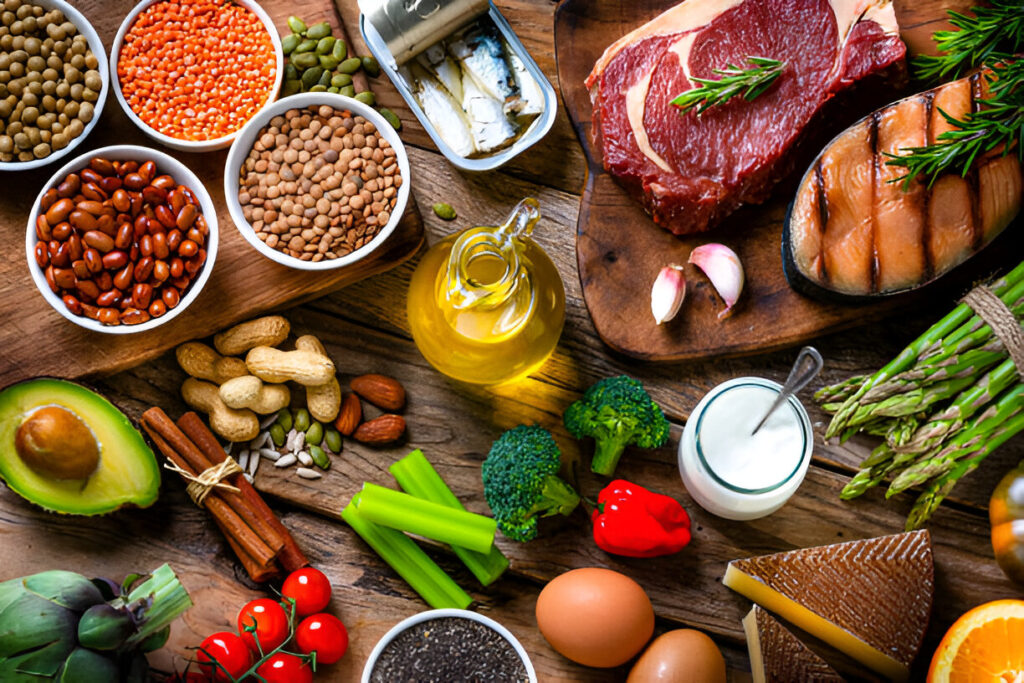Top 5 Basic Nutrition Principles and Healthy Diet
What are the basic nutrition principles? One may Ask!! Food is one of the most important factors that define our health and fitness. It is difficult nowadays to determine how to feed oneself properly due to the vast amount of diets available.

Nevertheless, knowledge of nutrition fundamentals can enable a person to take correct routs in relation to food intake as well as other aspects of a healthy lifestyle.
If the food you and your family take is balanced, then you have a sound mind and body, meaning you are healthy both physically and psychologically.
Top 5 Basic Nutrition Principles
Let’s discover Top 5 Basic Nutrition Principles and the role they play in the concept of Healthy Diet in this guide.
Regardless of your goals from wanting to gain muscles, lose weight, or just to gain some overall well-being, these concepts are a good start.
1. Balance Your Macronutrients
Macronutrients are the essentials of every diet. They are carbohydrates, proteins and fats and all of them are so important for the proper functioning of human body.
Knowing how these macronutrients should be utilised will assist in meeting energy requirements as well as attaining good health.
What Are Macronutrients?
Carbohydrates: These are what your body use as energy in the first instance You can imagine your body getting its power from them. Carbohydrates are found in grain products, fruits, vegetables and legumes.
Proteins: Protein can help build and fix tissue in muscles, skin and organs; Hence the name anabolic. The sources of proteins include the meats, fish, egg, dairy products, beans and nuts.
Fats: Fats are used for energy storage, proper cell function and for the production of hormones. Good fat is avocados, nuts, seeds, and olive oil among others foods on a healthy diet.
How to Balance Macronutrients
A balanced diet includes all three macronutrients in the right proportions:
Carbohydrates: Concentrate your calories between 45 and 65% of those you require for the day.
Proteins: Protein should contribute from 10% to 35% for daily total calorie intake.
Fats: Essential fatty can constitute between 20-35% of total calorie intake and should comprise of unsaturated fat.
Macronutrient partitioning is the systematic process of sustaining a proper carbohydrate to protein to fat ratio in order to facilitate provision of energy plus other nutrient products to the body tissues and organs.
2. Focus on Micronutrient-Rich Foods

Micronutrients, which include vitamins and minerals, are essential for maintaining overall health. Although they are required in smaller amounts than macronutrients, their impact on your body is significant.
Importance of Micronutrients
Micronutrients support various bodily functions:
- Vitamins: These are vital for immunity, skin health, and energy production. Examples include Vitamin C, Vitamin D, and B-complex vitamins.
- Minerals: Essential for bone health, muscle function, and fluid balance. Key minerals include calcium, potassium, and iron.
Sources of Micronutrients
To ensure an adequate intake of micronutrients, focus on consuming:
- Fruits and Vegetables: These are rich in vitamins, minerals, and antioxidants.
- Whole Grains: Provide B vitamins and essential minerals like magnesium and selenium.
- Lean Proteins and Dairy: Great sources of iron, calcium, and other vital nutrients.
Incorporating a variety of micronutrient-rich foods helps prevent deficiencies and promotes optimal health.
3. Emphasize Portion Control
While the quality of food is important, the quantity also plays a crucial role in maintaining a healthy diet. Overeating, even healthy foods, can lead to weight gain and other health issues. On the other hand, undereating can deprive your body of essential nutrients.
Understanding Portion Sizes
Portion control involves consuming the right amount of food to meet your body’s energy and nutrient needs without overindulgence. Here are some tips to manage portion sizes effectively:
- Use smaller plates to help control portions visually.
- Pay attention to hunger and fullness cues.
- Avoid eating directly from large packages or containers.
Benefits of Portion Control
Practicing portion control can help you:
- Maintain a healthy weight.
- Prevent overeating and reduce the risk of chronic diseases such as diabetes and heart disease.
- Improve digestion and energy levels.
Practical Portion Guidelines
Here are some general portion size recommendations:
- Protein: A serving should be about the size of your palm.
- Carbohydrates: A portion of cooked grains or pasta should be about the size of your fist.
- Fats: A serving of healthy fats like nuts or avocado should be about the size of your thumb.
4. Stay Hydrated

Proper hydration is often overlooked but is a fundamental component of a healthy diet. Water is essential for various bodily functions, including temperature regulation, nutrient transport, and waste elimination.
Why Hydration Matters
Water makes up about 60% of the human body and plays a critical role in:
- Maintaining body temperature.
- Supporting digestion and nutrient absorption.
- Lubricating joints and tissues.
- Promoting healthy skin.
How Much Water Do You Need?
The amount of water you need depends on factors like age, activity level, and climate. General guidelines suggest:
- Men: Around 3.7 liters (125 ounces) per day.
- Women: Around 2.7 liters (91 ounces) per day. This includes water from all sources, including beverages and food.
Tips for Staying Hydrated
- Carry a reusable water bottle and sip throughout the day.
- Include water-rich foods in your diet, such as cucumbers, watermelon, and oranges.
- Limit sugary and caffeinated beverages, which can contribute to dehydration.
5. Limit Processed Foods and Added Sugars

Processed foods and added sugars can contribute to various health issues, including obesity, diabetes, and heart disease. Reducing their intake is a key principle for maintaining a healthy diet.
The Impact of Processed Foods
Processed foods often contain:
- High levels of added sugars and unhealthy fats.
- Artificial additives and preservatives.
- Low levels of essential nutrients.
Consuming too many processed foods can lead to nutrient deficiencies and chronic diseases.
Why Limit Added Sugars?
Excessive sugar intake is linked to numerous health problems, such as:
- Weight gain and obesity.
- Increased risk of type 2 diabetes.
- Heart disease and dental issues.
How to Reduce Processed Foods and Sugars
- Cook at home using fresh, whole ingredients.
- Read food labels to identify hidden sugars and unhealthy additives.
- Choose healthier alternatives, such as fruits or nuts, instead of sugary snacks.
Building a Healthy Diet: Practical Tips
Creating and maintaining a healthy diet can seem daunting, but with a few practical tips, it becomes manageable.
1. Plan Your Meals
Meal planning helps you control what you eat and ensures you get a balanced diet. Allocate time each week to plan meals and prepare healthy snacks.
2. Practice Mindful Eating
Mindful eating involves paying full attention to your food, savoring each bite, and listening to your body’s hunger and fullness signals. This practice can help prevent overeating and improve your relationship with food.
3. Make Gradual Changes
Instead of overhauling your diet overnight, focus on making small, sustainable changes. Replace one unhealthy habit at a time, such as swapping sugary drinks for water or including an extra serving of vegetables in your meals.
4. Seek Professional Guidance
If you’re unsure where to start, consider consulting a registered dietitian or nutritionist. They can provide personalized advice based on your unique needs and goals.
Conclusion
Understanding and applying the Top 5 Basic Nutrition Principles is essential for achieving and maintaining a healthy diet.
By balancing macronutrients, prioritizing micronutrient-rich foods, practicing portion control, staying hydrated, and limiting processed foods and sugars, you can improve your overall health and well-being.
Remember, a healthy diet is not about strict restrictions or deprivation; it’s about making informed choices that nourish your body and support a long, vibrant life. Start small, stay consistent, and enjoy the journey to better health.







